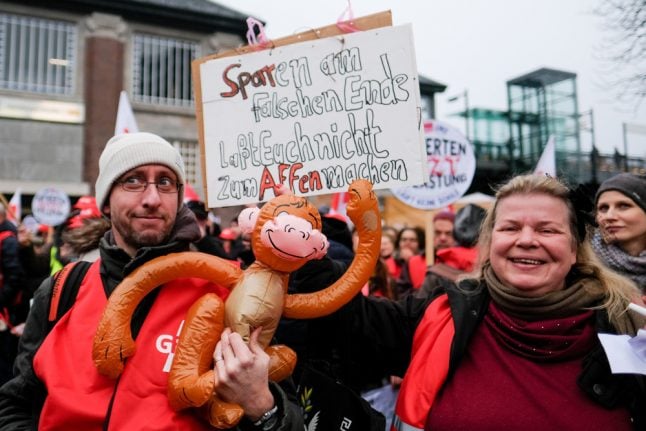Why are teachers going on strike?
Various unions are calling for pay increases of six percent, but state collective bargaining negotiators have rejected this. The unions argue the pay increases are to keep up with inflation, as well as because the states often have budget surpluses. In fact, including federal, state and community budgets, Germany reported a total surplus of €19 billion last year.
A second round of negotiations on Tuesday broke down, and a third round is supposed to begin on February 16th in Potsdam.
And it’s not just teachers who are striking: the unions also called on street maintenance and transport workers to go on strike on Thursday. Other public workers such as police and university hospital workers could also get involved in strikes in the days to come.
The unions also want more money for trainees. The changes would result in costs of an additional €7 billion, which state authorities say is too high.
Who has been affected by the teachers strikes?
 A protest amid the strikes in Hamburg. Photo: DPA.
A protest amid the strikes in Hamburg. Photo: DPA.
On Wednesday, thousands of teachers in Lower Saxony, Mecklenburg-Western Pomerania and North Rhine-Westphalia went on a “warning strike”.
Around 10,000 school workers in Germany’s most populous state, North Rhine-Westphalia, were called to a day-long strike by union GEW there, though local media reported that no classes were cancelled as a result.
GEW also called a strike in Lower Saxony, where around 20 schools had to cancel classes due to the strike, involving some 500 teachers and other school staff.
Thousands more in northern Mecklenburg-Western Pomerania left work, with 4,000 protesting in the state capital of Schwerin.
Another union, Verdi, called for all-day strikes for Thursday in Hamburg that are also impacting schools, with between 600 to 700 participants, according to the Hamburger Abendblatt. Some school offices have been closed while other schools and child care services had to deal with limited staff.
Within the 20 Hamburg schools hit by strikes, though, classes are not being greatly impacted.
Will the strikes continue?
Verdi has also called for strikes by all its public sector workers next Thursday in Hamburg, according to broadcaster NDR. Schools could also be affected by this, as well as various public administrative offices.



 Please whitelist us to continue reading.
Please whitelist us to continue reading.
Member comments